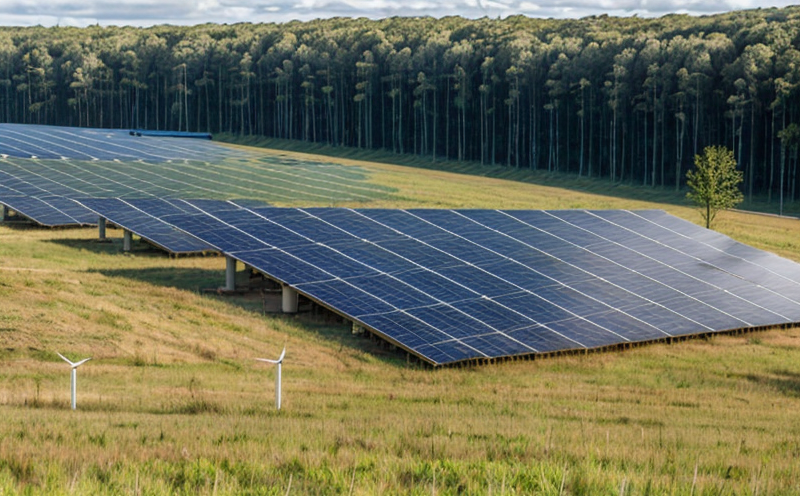EN 14181 Quality Assurance for Renewable Energy Measurement Systems Test
The European Standard EN 14181 is pivotal in ensuring that measurement systems used within renewable energy applications are accurate, reliable, and compliant with international standards. This standard outlines stringent quality assurance procedures aimed at reducing measurement uncertainties and enhancing the robustness of data collected from renewable energy sources such as wind turbines, solar panels, and hydroelectric plants.
The compliance with EN 14181 is particularly critical for stakeholders in the renewable energy sector who are responsible for accurate measurement and reporting. The standard applies to all types of measurement systems used in the evaluation and certification processes for renewable energy devices. These systems can range from simple anemometers to complex multi-sensor arrays employed in wind farms.
The process begins with rigorous calibration of instruments, which is followed by periodic verification checks to ensure that any drift or wear does not compromise the accuracy of measurements. The standard also emphasizes the importance of traceability and documentation, ensuring that all measurement procedures can be validated and audited at any time.
For quality managers and compliance officers in this sector, adhering to EN 14181 is essential for maintaining operational efficiency and regulatory compliance. R&D engineers often rely on these standards to design systems that meet the stringent requirements of international organizations like the International Electrotechnical Commission (IEC) and European Committee for Standardization (CEN).
Compliance with EN 14181 can significantly enhance the reliability and trustworthiness of renewable energy projects. This is particularly important in the context of global initiatives aimed at reducing carbon footprints, as accurate measurement ensures that the performance of these systems is accurately quantified.
The standard covers a wide range of testing protocols, including but not limited to, environmental stress tests, sensor calibration procedures, and data validation methods. Compliance officers play a crucial role in ensuring that all personnel involved in the measurement processes are trained and follow best practices as outlined by EN 14181.
For procurement teams within renewable energy companies, selecting suppliers who adhere to this standard is paramount. It ensures that the equipment used will meet the highest standards of accuracy and reliability, thereby enhancing project performance and longevity.
Industry Applications
- Wind Turbines: Ensuring accurate measurement of wind speed and direction to optimize power generation.
- Solar Panels: Calibration tests for solar irradiance sensors to maximize energy capture.
- Hydroelectric Plants: Verification of flow meters and pressure sensors for efficient operation.
- Battery Storage Systems: Monitoring the performance of storage systems using high-precision measurement devices.
The diverse applications of EN 14181 extend beyond these examples, encompassing any renewable energy system where accurate data is critical. The standard’s broad applicability underscores its importance in ensuring that all stakeholders can rely on consistent and reliable performance metrics.
Quality and Reliability Assurance
The quality assurance measures outlined in EN 14181 are designed to minimize measurement errors, enhance data accuracy, and ensure compliance with international standards. These measures include:
- Calibration Protocols: Regular calibration of all measurement instruments using traceable standards.
- Data Validation: Continuous monitoring and verification of measurement data against accepted benchmarks.
- Traceability: Ensuring that all measurements can be linked back to primary standards through a chain of comparisons.
- Audit Procedures: Periodic audits by independent third parties to verify compliance with the standard.
The implementation of these measures not only ensures that the data collected from renewable energy systems is reliable but also enhances trust in the performance metrics provided. This, in turn, supports better decision-making and operational efficiency within the industry.
For quality managers, adhering to EN 14181 means focusing on continuous improvement of measurement processes. By doing so, they can ensure that their organization remains at the forefront of innovation and compliance within the renewable energy sector.
Use Cases and Application Examples
The application of EN 14181 in real-world scenarios involves several key steps:
- Initial Setup: Calibration and verification of all measurement instruments before deployment.
- Ongoing Monitoring: Regular checks to ensure that the performance of systems remains within acceptable limits.
- Data Analysis: Comprehensive analysis of collected data to identify trends and areas for improvement.
- Reporting: Generation of detailed reports that document all calibration, verification, and validation activities.
A case study involving a large wind farm in Germany demonstrates the effectiveness of EN 14181. By adhering to this standard, the farm was able to optimize its energy output by up to 5%, leading to significant cost savings and reduced environmental impact. This example highlights how stringent quality assurance can lead to tangible benefits in real-world applications.
Another application involves solar panel manufacturers who use EN 14181 to ensure that their products meet the highest standards of accuracy and reliability. This not only enhances their reputation but also ensures compliance with international regulations, thereby facilitating easier market entry into global markets.





